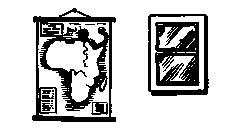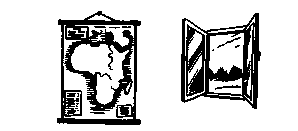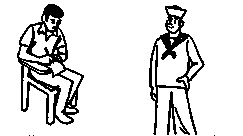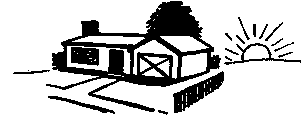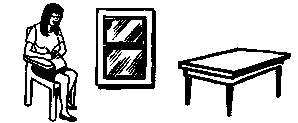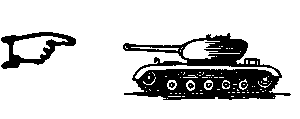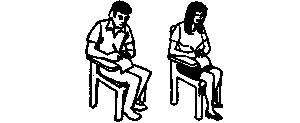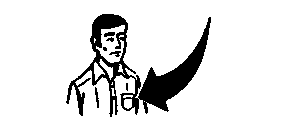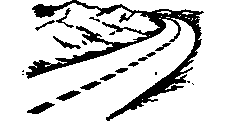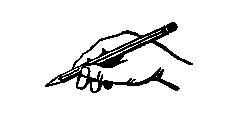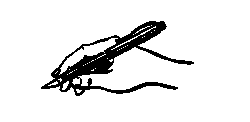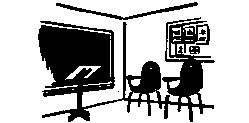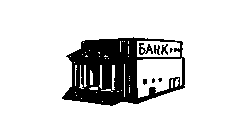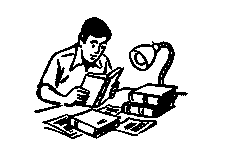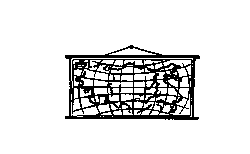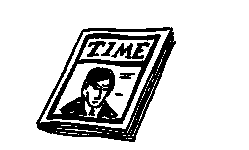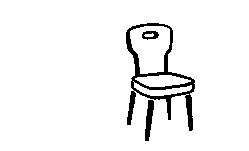Table of Contents
- RUSSIAN BASIC COURSE
- Preface
- Phase I Objectives
- Lesson 1
- Part I
- Section One: Introduction
- Section Two: The Cyrillic Alphabet
- Section Three: Cyrillic Letters
- Section Four: Cyrillic Script
- Section Five: Cyrillic Letters
- Section Six: Cyrillic Script
- Section Seven: Cyrillic Letters
- Section Height: Cyrillic Script
- Section Nine: Reading and Writing Practice
- Section Ten: Sound Discrimination - Unstressed o
- Section Eleven: Reading Practice
- Part II
- Part III
- Part IV
- Part V
- Part VI
- Part VII
- Part VIII
- 2. Lesson 2
- RUSSIAN BASIC COURSE
Table of Contents
- Preface
- Phase I Objectives
- Lesson 1
- Part I
- Section One: Introduction
- Section Two: The Cyrillic Alphabet
- Section Three: Cyrillic Letters
- Section Four: Cyrillic Script
- Section Five: Cyrillic Letters
- Section Six: Cyrillic Script
- Section Seven: Cyrillic Letters
- Section Height: Cyrillic Script
- Section Nine: Reading and Writing Practice
- Section Ten: Sound Discrimination - Unstressed o
- Section Eleven: Reading Practice
- Part II
- Part III
- Part IV
- Part V
- Part VI
- Part VII
- Part VIII
- 2. Lesson 2
List of Tables
- 1. The Аа Оо Кк Мм Тт letters.
- 2. Application
- 3. The Вв Нн Рр Сс Хх Уу letters.
- 4. Application
- 5. The ..... letters.
- 6. Application
- 7. Practice reading and writing the words below.
- 8.
- 9. Practice reading the following words aloud.
- 10. Vocabulary
- 11.
- 12. 5
- 13. 1
- 14. 9
- 15. 12
- 2.1. Vocabulary
- 2.2.
- 2.3.
- 2.4.
This module comprises Phase I of the Russian Course. It contains 10 lessons and is designed to encompass a four-week instructional time period. Language tasks and the supporting grammar, lexicon, and functions address everyday survival topics and courtesy requirements, and reflect a proficiency-level range of 0+ to 1.
The development of the ability to recognize, discriminate, and produce the sounds of the Russian language and to write the Cyrillic letters for these sounds.
Table of Contents
- Part I
- Section One: Introduction
- Section Two: The Cyrillic Alphabet
- Section Three: Cyrillic Letters
- Section Four: Cyrillic Script
- Section Five: Cyrillic Letters
- Section Six: Cyrillic Script
- Section Seven: Cyrillic Letters
- Section Height: Cyrillic Script
- Section Nine: Reading and Writing Practice
- Section Ten: Sound Discrimination - Unstressed o
- Section Eleven: Reading Practice
- Part II
- Part III
- Part IV
- Part V
- Part VI
- Part VII
- Part VIII
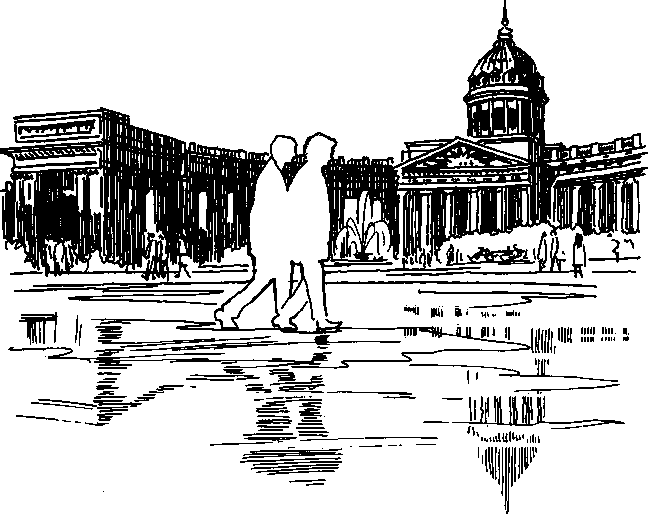
The Soviet Union is the largest country in the world, occupying an area of 8.65 million square miles (one-sixth of the earth's land mass). Russian is the administrative language of the Soviet Union and is spoken by more than 200 million people. The importance of the Russian language may be seen in the following statistics.
At the beginning of the 19th century, one European in seven was Russian.
At the beginning of the 20th century, one European in four was Russian.
Today, including annexed lands and satellite countries, one of every two Europeans is either Russian or under Soviet rule.
The situation after 1989. In 1989, the Soviet Union collapsed, and doesn't exist anymore.
Russian uses the Cyrillic rather than the Latin alphabet. There are 33 letters in the Russian alphabet and, with few exceptions, there is basically only one corresponding pronunciation for each letter. Therefore, having learned the alphabet, one can read and pronounce Russian words more or less correctly. The letters of the Cyrillic alphabet are introduced in groups on the following charts.
The figure below shows Cyrillic letters that are similar in form to English letters and that denote similar sounds.
Table 1. The Аа Оо Кк Мм Тт letters.
| PRINTED | WRITTEN | SIMILAR TO ENGLISH | COMMENTS |
 |  | a: father, palm, car, arm | The Russian а sound is a bit shorter than its counterpart in English. |
 |  | o: more, pore | The Russian о sound is never as in the English " so." |
 |  | k: skill, scotch, crab, crash | The Russian к sound is not drawn out. |
 |  | m: my, mama, me, moose | |
 |  | t: stop, tool, tick, tot | The tongue is against the back of the upper teeth (as in seventh"). |
Below are some Russian words formed from the letters presented in Figure above. Practice reading and writing these words.
The figure below shows Cyrillic letters which are similar to English letters in form, but that denote different sounds.
Table 3. The Вв Нн Рр Сс Хх Уу letters.
 |  | v: voice, vote | |
 |  | n: note, now ninth | The tongue is against the back of the upper teeth (as in "ninth") . |
 |  | r | There is no exact equivalent; p is rolled or trilled as in the Spanish. |
 |  | s: son, so, sell | |
 |  | h: hut, Bach | The х sound is close to the Spanish j in "Juan" and "Jose." |
 |  | oo; moon, ooze, tool, boot | The Russian sound у is a bit shorter than its English counterpart. |
Below are some Russian words formed from the letters presented in Figure above. Practice reading and writing these words
Below are some Russian words formed from the letters presented in Figure above. Practice reading and writing these words
Table 7. Practice reading and writing the words below.
| дом | дар | ду́ма | акт |
| том | так | тур | Анна |
| сом | сан | суро́к | ум |
| рот | рак | рука́ | а́рка |
| кот | как | кум | о́хра |
| нос | нас | кутро́ | у́рна |
| вон | вас | рву | антра́кт |
| мох | мат | му́ха | атама́н |
| хор | хам | ху́нта | Ма́рта |
The unstressed Russian о is pronounced like an unstressed Russian a. Compare the following words.
Stress is the pronunciation of a vowel with greater intensity, emphasis, or loudness than if it were unstressed.
In Russian, stress not only determines the correct pronunciation of a word but may even alter its meaning. Consequently, in learning new vocabulary it is imperative that you learn the correct stress of each word as well as the changes that may accompany variations in form (e.g., singular to plural). To assist you in the process of memorization, stress patterns will be established wherever possible.
Table 10. Vocabulary
|
Вот |
here is ... |
|
Да |
yes |
|
Дом Вот |
house Here is the house. |
|
Дома |
at home |
|
Доска Вот |
blackboard Here is the blackboard. |
|
Карман Вот |
Here is the pocket. |
|
Карта Вот |
map Here is the map. |
|
Комната Вот |
room Here is the room. |
|
Кто? |
who? |
|
Курсант Кто |
student (male) (see note end of page) Who is the student? |
|
Курсантка Вот |
student (female) (see note end of page) Here is the student. |
|
Матрос Кто |
seaman, sailor Who is the sailor? |
|
Окно Вот |
window Here is a window. |
|
Он - Кто - Он |
he - Who is he? - He is a student. |
|
Она Она |
she She is at home. |
|
Рука Вот |
hand Here is a hand. |
|
Там - Карта - Да, карта |
there - Is the map (over) there? - Yes, the map is (over) there |
|
Танк Там |
tank (military vehicle) The tank is (over) there |
|
Тут Тут комната, там |
here The room is (over) here, the window is (over) there. |
|
Урок - Тут - |
lesson, class (the activity, not the classroom) - Is the class here? - Yes. |
|
Утро |
morning |
![[Note]](file:/home/eric/bin/OxygenXMLEditor12.2/frameworks/docbook/xsl/images/note.png) | Note |
|---|---|
The word курсант (ка) refers to a student in a military school. |
Listen to your instructor read the exchanges aloud. Pay particular attention to the stress and intonation patterns. Practice voicing the exchanges.
Table 11.
| 1. | - Кто там? | Who's over there? |
|---|---|---|
| - Там курса́нт. | A student (male) is there. |
| 2. | - Он матро́с? | Is he a sailor? |
|---|---|---|
| - Да, он матро́с. | Yes, he is a sailor |
| 3. | - Курса́нтка тут? | Is the student (female) here? |
|---|---|---|
| - Да, она́ тут, | Yes, she's here. |
| 4. | - Кто до́ма? | Who's at home. |
|---|---|---|
| - Она́ до́ма. | She's at home. |
| 5. | - Доска́ тут? | Is the blackboard here? |
|---|---|---|
| - Да, доска́ тут. | Yes, the blackboard is here. |
Complete the sentences using the correct forms of the words in parentheses. Translate the sentences into English.
- 1.1. Кто ___? (he)
- 1.2. Тут ___. (student, male)
- 1.3. ___ там? (who)
- 1.4. Там ___. (student, female)
- 1.5. Курса́нт ___? (at home)
- 1.6. ___, курса́нт до́ма. (yes)
- 1.7. Курса́нтка ___? (there)
- 1.8. Да, ___ там. (she)
- 1.9. Кто ___? (he)
- 1.10. Он ___. (seaman)
- 1.11. ___ ко́мната. (here is)
- 1.12. Вот ___. (map)
- 1.13. ___ там. (house)
- 1.14. ___ тут. (blackboard)
- 1.15. Вот ___. (pocket)
| |
1.1. | Кто
|
Кто он? | |
1.2. | Тут
|
Тут студе́нт. | |
1.3. |
|
Кто там? | |
1.4. | Там
|
Там студе́нтка. | |
1.5. | Курса́нт
|
Курса́нт дома? | |
1.6. |
|
Да, курса́нт до́ма | |
1.7. | Курса́нтка
|
Курса́нтка там? | |
1.8. | Да,
|
Да, она там. | |
1.9. | Кто
|
Кто он? | |
1.10. | Он
|
Он матрос. | |
1.11. |
|
Тут ко́мната. | |
1.12. | Вот
|
Вот карта. | |
1.13. |
|
Дом там. | |
1.14. |
|
доска тут. | |
1.15. | Вот
|
Вот карман. | |
Practice reading the following exchanges aloud.
- Он курса́нт?
- Да, он курса́нт.
- Она курса́нтка?
- Да, она курса́нтка.
- Кто до́ма?
- Матро́с до́ма.
- Тут уро́к?
- Да, тут уро́к.
- Окно́ там?
- Да, окно́ там.
Practice writing the following words.
тот
окно
стакан
Москва
дом
доска
урок
удар
Антон
внук
вода
комната
Read the models paying particular attention to the intonational patterns.
| Question | Answer |
| Кто он? | Он курса́нт. |
| Кто она́? | Она́ курса́нка. |
| Question | Answer |
| Он курса́нт? | Да, он курса́нк. |
| Она́ курса́нка? | Да, она́ курса́нка. |
| Note that Russian uses a rising intonation in questions and a falling intonation in answers. | |
 | |
| Он курсант? | Да, он курсант. |
Form two questions for each of the sentences below as in the model.
| Он курса́нт. |
|
Она курса́нтка.
Он матро́с.
Он курса́нт.
Она́ тут.
Он там.
Курса́нт тут.
Матро́с там.
Answer the questions using complete sentences as in the model.
| Кто там? |
|
Кто там? (Матро́с)
А[1] кто тут? (Курсантка)
Она́ тут? (да)
Матро́с там? (Да)
Кто он? (Матро́с)
А кто она́? (Курса́нтка)
Она курса́нтка? (Да)
А кто курса́нт? (Он)
Он курса́нт? (Да)
А кто курса́нтка? (Она)
А кто матро́с? (Он)
Дом там? (Да)
А ко́мната тут? (Да)
Курса́нт до́ма? (Да)
А курса́нтка до́ма? (Да)
Доска́ тут? (Да)
А ка́рта там? (Да)
Unlike English (which has the definite and indefinite articles "the" and "a/an"), Russian lacks articles. The meanings conveyed in English by articles are rendered in Russian by context or word order.
Там карта. There is a map over there.
Карта там. The map is over there.
The verb "to be" in English has present tense forms ("am, is, are") which are used as linking verbs. The corresponding forms in Russian are not used.
He is a sailor. Он матрос.
She is a student. Она курсантка.
Exercise.
Provide Russian equivalents for the following sentences.
- Who is he?
- He's a student (male).
- Who is she?
- She is a student (female).
- Is he a seaman?
- Yes, he is a seaman.
- Is the map (over) there?
- Yes, the map is (over) there.
- Is the class (over) here?
- Yes, the class is (over) here.
Practice reading the following words and word pairs.
Table 13. 1
| тут - тот | так -как | рак - рок | мох - мах |
| тот - дот | как - кок | рок - ром | мах - хам |
| дот - дон | кок - мор | ром - мор | хам - сам |
| Дон - дом | ком - мок | мор - вор | сам - сом |
| дом - дам | мок - мак | вор - вон | сом - сок |
| дам - там | мак - му́ка | вон - вот | сок - сук |
| там - том | му́ка - мука́ | вот - ва́та | сук - сух |
| том - мот | му́ха - мука́ | ва́та - ха́та | сух - су́мма |
| мот - мо́да | мука́ - кума́ | ха́та - тара́ | су́мма - су́хо |
| мо́да - до́ма | кума́ - куда́ | Та́ра - ра́на | су́хо - са́хар |
| до́ма - да́ма | куда́ - туда́ | ра́на - ра́ма | са́хар - ка́сса |
Table 14. 9
| уро́к | ва́хта | ко́нтур |
| уда́р | давно́ | ко́нкурс |
| тума́н | ква́рта | карма́н |
| со́ус | матро́с | су́мрак |
| ко́нус | кра́ска | ту́ндра |
| стака́н | у́рна | ко́мната |
| кво́та | м́арка | канта́та |
| сно́ва | су́мка | курса́нтка |
| дра́ма | но́рма | стару́ха |
Table 15. 12
| она́ | соро́ка | у́тро |
| окно́ | воро́та | ра́но |
| вода́ | домкра́т | во́рох |
| сова́ | Москва́ | ро́кот |
| коса́ | коро́ва | тра́ктор |
| доска́ | воро́на | хо́хот |
| нора́ | острова́ | су́дно |
| дрова́ | сторона́ | тру́дно |
| корма́ | хромота́ | ко́ротко |
Listen to your instructor read the following sentences. Pay particular attention to stress and intonation. Repeat the sentences after your instructor.
- Вот танк.
- Танк тут.
- Танк тут?
- Да, танк тут.
- Там ка́рта.
- Ка́рта там.
- Ка́рта там?
- Да, ка́рта там.
- Вот Анто́н.
- Кто он?
- Он курса́нт.
- Вот Анна.
- Она́ курса́нтка?
- Да, она́ курса́нтка.
- Кто тут?
- Тут матро́с.
- Он курса́нт?
- Да, он курса́нт.
- Кто там?
- Там курса́нтка.
- А кто тут?
- Тут курса́нт.
- Анто́н до́ма?
- Да, он до́ма.
- А А́нна тут?
- Да, она́ тут.
Read the following sentences aloud. The words that you have not had are included for pronunciation only.
Exercise 1.
Listen to your instructor read the following sentences. Indicate which utterances are questions and which are answers by supplying the correct punctuation.
Тут танк_
Тут танк_
Доска́ тут_
Доска́ тут_
Он курса́нт_
Он курса́нт_
Матро́с до́ма_
Матро́с до́ма_
Ко́мната там_
Ко́мната там_
Там окно́-
Там окно́_
Exercise 2.
Write the words read by your instructor.
Exercise 3.
Read the words you wrote and provide an English translation for each.
Exercise 1.
Там Москва́, а тут Курск.
Тут доска́, а там ка́рта.
Анто́н - курса́нт, а А́нна - курса́нтка.
Вот дом. Тут ко́мната, а там окно́.
Тут у́тро, а там?
Вот тра́ктор, а тут мото́р.
Вот дом. Курса́нтка до́ма.
Там Том. Он матро́с.
Exercise 2.
Read the following sentences aloud and provide an English translation of each.
Вот дом. Там матро́с.
- Курса́нтка до́ма?
- Да, она́ до́ма.
Вот ко́мната. Тут окно́, там доска́.
А́нна - курса́нтка.
Ато́н - курса́нт. Он матро́с.
Practice writing the following words and sentences,
утро, стакан, драма, Москва, трудно, монарх, вахта, сорока
Вот рука.
Тут комната, там окно.
Тут урок.
Доска там, карта тут.
Вот Антон.
Он матрос.
Вот Анна, она дома.
Кто она?
Она курсантка.
Там танк.
Translate the Russian sentences into English and the English sentences into Russian.
- Is the house here?
- Да, дом тут.
- Who is at home?
- Курсант до́ма.
- Is he a sailor?
- Да, он матрос.
- Is the window there?
- Да, окно там.
- And is the blackboard here?
- Да, доска тут.
- Is Anna a student?
- Да, Анна - курсантка.
- Who is he?
- Он курсант.
- And who is she?
- Она курсантка.
- Is the lesson here?
- Да, урок тут.
- Is the map there?
- Да, карта там.
Exercise 1.
Ask another student as many questions as possible on the basis of the pictorial cues.
Exercise 2.
Make as many inquiries as you can concerning the people and items in your classroom.
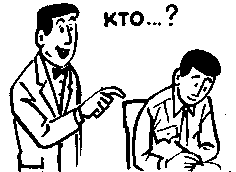
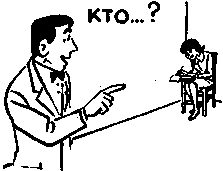
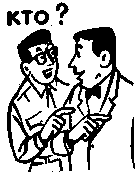
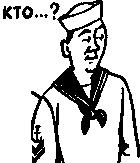
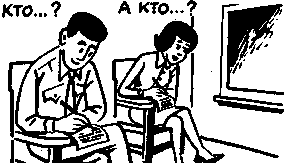
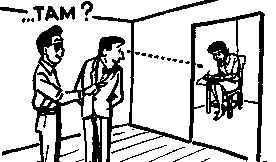
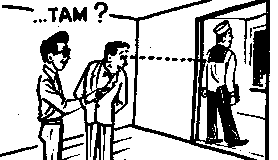

[1] In conversation, the connective a is often placed at the beginning of a sentence, particularly in questions. It serves to introduce a new idea or topic.
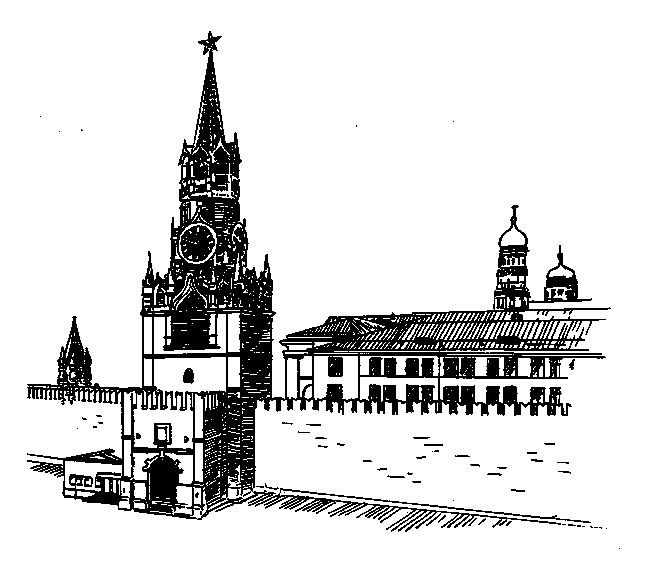
The Russian sound System
Figure 1 shows Cyrillic letters denoting different sounds and having different forms from English letters.
| PRINTED | WRITTEN | SIMILAR ТО ENGLISH | COMMENTS |
|---|---|---|---|
 |  | sh: ship, shame | |
 |  | p: pot, pool | |
 |  | Similar to the sound of the English e in the words "entry, let, end," and "met." | |
 |  | ch: cheese, cheap, lunch | |
 |  | l: ill, loot, lip | |
 |  | b: bet, bail, big |
Practice reading and writing the following words.
The letter ш:
Шу́ра 
наш 
ду́шно 
штат 
марш 
душа́ 
The letter n:
пар 
драп 
тропа́ 
пот 
стол 
Па́ша 
The letter э:
э́хо 
сэр 
э́кспорт 
Эмма 
поэ́т 
аэропо́рт 
The letter ч:
час 
Та́чка 
рвач 
Чоп 
ту́ча 
матч 
The letter л:
Ла́ра 
а́тлас 
стол 
лото́ 
сва́лка 
стул 
The letter б:
бар 
ко́бра 
Бэ́ла 
шва́бра 
Practice reading aloud the following sets of words.
шут ваш ко́шка шум шах пунш кро́шка хоро́ш штат душ ка́ша ду́шно пуст суп крупа́ ко́мпас парк храп спорт укро́п порт труп топка пуск э́то нэп ало́э поэ́т э́ра мэр кано́э э́кспорт эста́мп сэр аэропо́рт экскава́тор чох но́чка луч чума́ ча́сто та́чка врач кума́ч чу́до ку́ча путч ка́чка лом пла́ха класс му́скул лу́на слова́ капра́л па́лка лупа́ полк ку́пол ла́мпа бунт рабо́та бу́ква па́луба банк клу́мба бокс да́мба брат соба́ка таба́к ко́бра
Figure 2 below shows Cyrillic letters that denote sounds similar to those of English letters, but with different forms.
| PRINTED | WRTITTEN | SIMILAR TO ENGLISH | COMMENTS |
|---|---|---|---|
 |  | g: get, go | Never pronounced as in English "gem." |
 |  | zh: pleasure, azure | The Russian sound ж is considerably harder than the corre sponding English sound. |
 |  | z: lazy, izone, zero | |
 |  | Y: yellow, yonder, boy, say, by |
Practice reading and writing the following words after your instructor.
The letter г:
гам 
когда́ 
гул 
доро́га 
Го́ша 
курга́н 
The letter ж:
жар 
са́жа 
жара́ 
Жо́ра 
лу́жа 
ну́жно 
The letter з:
зал 
ро́за 
Зо́ра 
зола́ 
му́за 
гроза́ 
The letter й:
йо́ра 
майо́р 
свой 
Йорк 
ко́йка 
май 
Practice reading aloud the following sets of words.
грамм шла́га пурга́ гу́сто гора́ анга́р груп бума́га жук пожа́р лу́жа кружо́к жгут ба́ржа жарго́н мажо́р звук ба́за каза́рма ба́за замо́к бро́нза забо́р зо́лото йо́та ча́йка сара́й у́йма Йо́ван война́ како́й трамва́й
Conversational Models
Table 2.1. Vocabulary
|
| |||||||
|
| |||||||
|
| |||||||
|
| |||||||
|
| |||||||
|
| |||||||
|
| |||||||
|
| |||||||
|
| |||||||
|
| |||||||
|
| |||||||
|
| |||||||
|
| |||||||
|
| |||||||
|
| |||||||
|
| |||||||
|
| |||||||
[a] Это means THIS (THAT, THESE, THOSE). It is used as follows:
| ||||||||
Listen to your instructor read the following exchanges. Pay particular attention to the stress and intonation patterns. Practice the exchanges with another student.
Table 2.2.
| 1. | Что э́то? | What's that? |
|---|---|---|
| Это банк. | That's the bank. |
| 2. | Банк тут? | Is the bank here? |
|---|---|---|
| Да, банк тут. | Yes, the bank's here. |
| 3. | Это ваш журна́л? | Is this your magazine? |
|---|---|---|
| Да, это наш журна́л. | Yes, it's our magazine. |
| 4. | Наш класс там? | Is our classroom there? |
|---|---|---|
| Да, ваш класс там. | Yes, your classroom is there. |
| 5. | Ва́ша шко́ла тут? | Is your school here? |
|---|---|---|
| Да, тут. | Yes, it's here. |
| 6. | На́ша каза́рма там? | Are our barracks there? |
|---|---|---|
| Там на́ша каза́рма. | Our barracks are there. | |
| Ваша каза́рма тут. | Your barracks are here. |
| 7. | Доро́га там? | Is the road there? |
|---|---|---|
| Да, доро́га там. | Yes, the road is (over) there. |
| 8. | Кто до́ма? | Who's at home? |
|---|---|---|
| Майо́р до́ма. | The major 's at home. |
Progress Check
Complete the sentences with the correct form of the words in parentheses. Translate the sentences into English.
- ___ тут? (what)
- Тут на́ша ___. (school)
- ___ там? (what)
- Там на́ша ___. (barracks)
- Это ва́ша ___? (paper)
- Да, это ___ бума́га. (our)
- Это ваш ___? (class)
- Да, ___. (ours)
- Тут ваш ---, ваш --- .(table)(chair)
- Кто ___? (is that)
- Это наш ___. (major)
Practice reading the following sentences and exchanges aloud.
Э́то доро́га. Тут на́ша шко́ла, там на́ша каза́рма.
Вот ваш класс. Тут ваш стол, там ваш стул.
- Это ваш банк?
- Да, наш.
- Кто э́то?
- Э́то курса́нт.
- Он солда́т?
- Да, он солда́т.
- Что тут?
- Тут наш банк.
- Что там?
- Там на́ша шко́ла.
Это ва́ша каза́рма. На́ша каза́рма там.
Practice writing the following words.
| Урал |  | порт |  |
| май |  | бомба |  |
| база |  | закон |  |
| бой |  | внук |  |
| работа |  | голова |  |
Structural Models
Exercise 1. Form questions and answers using the words below as in the model.
Дот
Карман
Матрос
Окно
Курсантка
Майор
Стул
Карандаш
Exercise 2. Form questions and answers using the words below as in the model.
Question Answer Что это?
Кто это?
Это доска.
Это солдат.
бумага
рука
урок
курсант
карта
солдат
Доска
стол
In Russian all nouns are divided into three categories called "genders": the MASCULINE gender, the FEMININE gender, and the NEUTER gender. The gender of a noun is usually determined by its ending. See Figure 3 below.
| Gender | Ending | Example |
|---|---|---|
| Masculine | Most nouns ending in a consonant | банк, дом, курса́нт |
| Feminine | Most nouns ending in а | доро́га, курса́нтка, шко́ла |
| Neuter | Most nouns ending in о | окно́, у́тро |
The possessive pronouns[2] ваш and наш change their form so as to agree in gender with the nouns to which they refer. See Figure 4 below.
Это наш класс. Это на́ша шко́ла.
Это ваш курса́нт. Это ва́ша курса́нтка.
Exercise 1. Form questions and answers using the words be- low as in the model.
Question Answer Это ваш
ваша
класс?
казарма?
да, это наш
наша
класс.
казарма.
банк
журна́л
шко́ла
ру́чка
стол
ко́мната
стул
бума́га
курса́нтка
доска́
Exercise 2. Answer the questions in complete sentences using the words in parentheses as in the model.
Что э́то? Это бума́га. Что это? (доро́га)
А что это? (каза́рма)
Кто это? (курса́нтка)
А кто это (солда́т)
Это каранда́ш? (да)
А это ру́чка? (да)
Это майо́р? (да)
Это ваш каранда́ш? (да)
Ва́ша каза́рма там? (да)
А ваш класс тут? (да)
Что тут? (ка́рта)
Это ва́ша ка́рта? (да)
А что там? (банк)
Это ваш банк? (да)
Кто там? (курса́нт)
Это ваш курса́нт? (да)
А кто тут? (курса́нтка)
Это ва́ша курса́нтка? (да)
Exercise 3. Form two questions for each of the sentences given below as in the model.
| Это катандаш. |
|
Это окно́.
Это солда́т.
Это стул.
Это урок.
Тут майо́р.
Там ка́рта.
Это рука́.
Это курса́нтка.
Там матро́с.
Тут доро́га.
Это ру́чка.
Это стол.
Application
Practice reading aloud the following words and word pairs.
шут - туш
туш - душ
душ - дух
дух - пух
пух - бух
бух - буй
буй - бой
бой - вой
вой - вол
вол - гол
гол - кол
шар - жар
жар - жара
жара - Жора
Жора - рожа
рожа - кожа
кожа - коза
коза - коса
коса - касса
касса - каша
каша - чаша
чаша - Саша
Саша - сажа
шум - чум
чум - ГУМ
ГУМ - гам
гам - сам
сам - зам
зам - зал
зал - зол
зол - зола
зола - лоза
лоза - сало
сало - лассо
бар - пар
пар - пара
пара - папа
папа - баба
баба - жаба
жаба - Жанна
Жанна - Га'нна
Ганна - гамма
гамма - лама
лама - Эмма
Эмма - это
это - йо'та
план
спрут
столп
карн
брат
блок
зубр
знак
звук
шторм
шрам
шлак
марш
жбан
жгут
жду
жму
лгун
глух
гной
грач
чту
матч
харч
компас
шапка
копна
группа
колба
торба
служба
бомба
банджо
нарзан
бронза
шашка
душно
замша
лапша
важно
спаржа
ханжа
мужлан
слово
горло
кукла
пурга
розга
тайга
штанга
бахча
чукча
саранча
парча
чалма
волна
кувалда
война
пойма
чайка
сайгак
шайба
кайло
кайра
ух
ох
ах
эх
ум
омут
Амур
эму
сор
сэр
пар
пэр
аркан
экран
украл
орган
это
эра
поэт
алоэ
это
эра
поэт
алоэ
Repeat the exchanges after your instructor. Pay particular attention to stress and intonation.
- Кто э́то?
- Это курса́нт.
- Кто она́?
- Она курсан́тка.
- Что э́то?
- Это ру́чка.
- Что там?
- Там на́ша каза́рма.
- Это класс?
- Да, это класс.
- Это ваш класс?
- Да, это наш класс.
- Ваш класс тут?
- Да, наш класс тут.
- А там на́ша ко́мната?
- Да, там ва́ша ко́мната.
- Что тут?
- Тут наш дом.
- Кто до́ма?
- До́ма курса́нт.
- Он до́ма?
- Да, он до́ма.
- Он солда́т?
- Да, он солда́т.
- А кто там?
- Там майор.
- Майо́р там?
- Да, майор там.
Exercise 1. Form questions and answers as in the model.
Это наш стол. Что это?
Это наш срол.
Это на́ша шко́ла.
Это ваш майо́р.
Тут банк.
Там окно́.
Это наш солда́т.
Тут ваш стул.
Там ва́ша доро́га.
Это ваш каранда́ш.
Это на́ша курса́нтка.
Ваш журна́л тут.
Наша доска́ там.
Это наш дом.
Exercise 2. Form questions and answers as in the model.
Это ваш журнал? Это ваш журнал?
Да, это наш журнал.
Это на́ша каза́рма
Тут наш танк.
Ва́ша доро́га там
Это майо́р.
Ваш класс тут.
Это на́ша ко́мната.
Наш банк там.
Ва́ша курса́нтка до́ма.
Это ва́ша ру́чка
Ваш стол тут.
Это наш солда́т.
Там на́ша шко́ла.
Comprehension
Write the sentences read by your instructor and translate them into English.
Read the following sentences aloud and translate them into English.
Вот ваша ручка. Вот карандаш, тут бумага.
- Это ваш журнал?
- Да, наш.
Ваш банк тут, а наш банк там.
Курсант тут, а курсантка дома.
Read the following sentences aloud. The words that you have not had are included for pronunciation practice only.
Это наша школа. Вот ваш класс. Тут ваш стол.
- Что это?
- Это ваш паспорт.
- Кто он?
- Он майо́р.
Это дорога. Тут парк. Там наша казарма.
Вот ваша бумага, ваша ручка, ваш карандаш.
Вот наш порт.
Маша - курсантка. Она дома. Антон - курсант. Он тут.
Reinforcement
Practice writing the following words and sentences.
бронза, шайба, парча, пурга, горло, замша, мужлан, экран, аэропорт
- Что это?
- Это журнал.
Там дорога.
Тут наш солдат.
Ваш майор дома.
- Это школа?
- Да, это наша школа.
Вот ваша казарма.
Тут ваш стол, там ваш стул.
- Кто это?
- Это наша курсантка Тамара.
Exercise 1. Complete the exchanges based on the pictorial cues.
Кто ...? 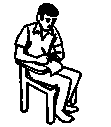
А кто ...? 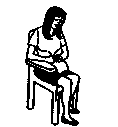
Это ... . Это ... . Он ...? 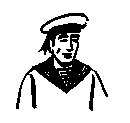
... тут? 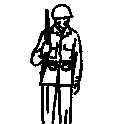
Да ... . Тут ... . Что ...? 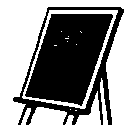
А что ...? 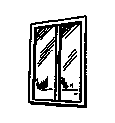
Это ... . Это ... . Это ...? 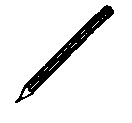
А это ...? 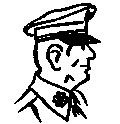
Да, ... . Да, ... . Exercise 2. Form as many questions and answers as possible based on the pictorial cue.
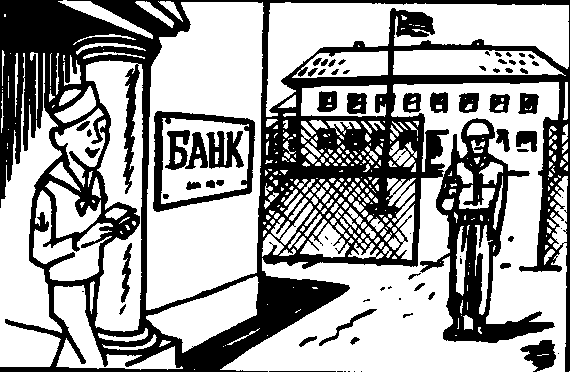
Communication
Translate the Russian sentences into English and the English sentences into Russian. Work with another student.
- Это банк?
- Yes, this is a bank.
- Доро́га там?
- Yes, the road is there.
- Тут каза́рма?
- Yes, the barracks is here.
- А школа там?
- Yes, the school is there.
- Это ва́ша шко́ла?
- Yes, this is our school.
- Ваш класс тут?
- Yes, (it is) here.
- Ва́ша ру́чка там?
- Yes, (it is) over there.
- What is this?
- Это каза́рма.
- And what is that?
- Это шќола.
- Who is that?
- Это солда́т.
- And who is that?
- Это майо́р.
- Is the major here?
- Да, он тут.
- And the soldier?
- А солда́т дома.
- Is this your barracks?
- Да, на́ша.
- Is that our magazine?
- Is that our magazine?
Exercise 1. Form questions and answers as in the model.
Instructor Students А́нна, Анто́н, Том - Кто э́то?
- Э́то А́нна.
- А э́то кто?
- Э́то Анто́н.
- А э́то?
- А э́то Том.
Exercise 2. Form questions and answers as in the model.
Instructor Students журна́л, ка́рта, бума́га - Что э́то?
- Э́то журн́л.
- А э́то что?
- Э́то ка́рта.
- А э́то?
- А э́то бума́га.
Ask as many questions as possible using the pictorial cues and the examples in the model.
| Что ... |
Это? Там? Тут? | Кто ... |
Это? Там? Тут? | Это ...? |
Тут ...? Там ...? |
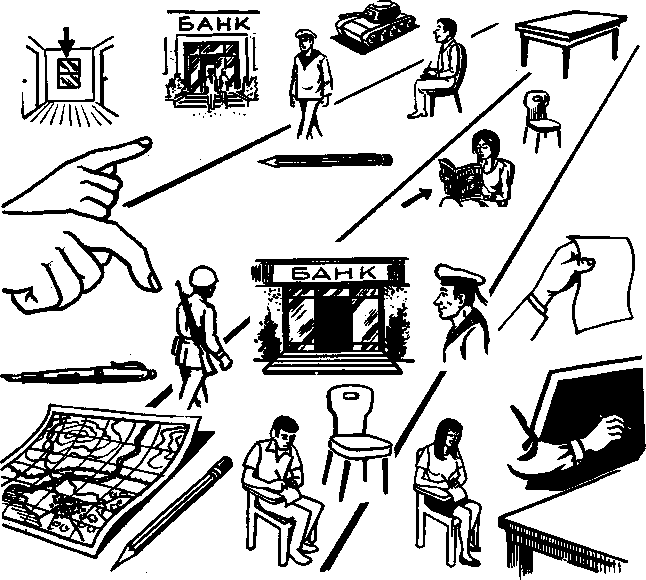
Table of Contents
















